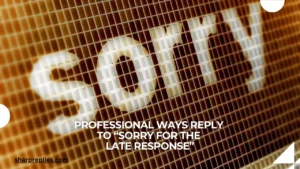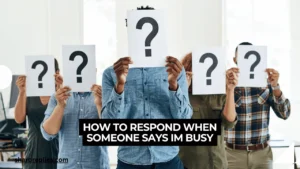We’ve all been there. A friend, a colleague, or even a loved one says something that hurts, or perhaps their actions lead to disappointment or frustration. But what happens when that person comes forward and offers an apology?
The situation often leaves us with mixed emotions: we may feel relief, but also confusion about how to respond. Accepting an apology gracefully is not just about saying “It’s okay.” It involves a thoughtful response that demonstrates understanding and emotional maturity.
In this article, we explore 50 phrases you can use to accept an apology with grace and poise. Whether you are trying to maintain a professional relationship, salvage a friendship, or rebuild trust with a loved one, knowing how to respond in a way that acknowledges the apology while preserving your own feelings is an essential skill.
We’ll walk through various situations where these phrases can come in handy, why they matter, and how to incorporate them into your personal or professional life.
Contents
- 1 The Significance of Accepting an Apology
- 2 50 Phrases to Accept an Apology: The Right Words for Every Situation
- 3 When Professionalism Meets Apology: How to Respond in Work Situations
- 4 The Emotional Impact of Accepting an Apology
- 5 When Not to Accept an Apology Right Away: The Art of Setting Boundaries
- 6 Conclusion:
- 7 FAQ’s
- 7.0.1 Why is accepting an apology important?
- 7.0.2 How do I know when to accept an apology?
- 7.0.3 What if I don’t feel ready to forgive?
- 7.0.4 Can I accept an apology without fully forgiving the person?
- 7.0.5 How should I respond if the apology feels insincere?
- 7.0.6 Is it necessary to always respond to an apology?
The Significance of Accepting an Apology
An apology is not just a form of making amends; it’s a step toward healing. When someone apologizes, they are acknowledging their mistake and expressing regret.
The way we respond to an apology can either deepen the bond between us and the other person or create further tension. Accepting an apology graciously shows maturity, emotional intelligence, and compassion. It allows for emotional closure and helps to move past negative feelings.
However, accepting an apology doesn’t mean you have to immediately forgive or forget the incident. It’s about allowing the other person the opportunity to show sincerity, and at the same time, allowing yourself the space to process your emotions.
The response you choose to give can set the tone for the future of your relationship with that person. Whether it’s a formal interaction or a casual situation, understanding how to reply effectively is crucial.
50 Phrases to Accept an Apology: The Right Words for Every Situation
Responding to an apology involves more than just saying “It’s fine.” Depending on the situation, your relationship with the person, and how much emotional investment is involved, different phrases are needed to convey your feelings effectively. Here are some examples:
- “I appreciate your apology.” – Simple and sincere.
- “Thank you for saying that. It means a lot.” – Acknowledging the effort.
- “I understand, and I’m glad we can talk about it.” – Showing emotional maturity.
- “It wasn’t easy for you to apologize, and I respect that.” – Recognizing the courage it took.
- “I’m grateful for your honesty.” – Valuing transparency.
These phrases are just a glimpse into the variety of ways you can accept an apology. The idea is to match your response to the situation—whether you’re easing tension, showing empathy, or reinforcing the positive aspects of the relationship.
You don’t always have to offer complete forgiveness right away, but acknowledging the apology shows that you’re open to healing the relationship.
When Professionalism Meets Apology: How to Respond in Work Situations
In a professional environment, the stakes can be higher when it comes to accepting an apology. The way you respond can impact workplace dynamics, the future of the professional relationship, and even your own reputation.
You don’t want to be too casual, but you also don’t want to sound dismissive. Here are a few examples of professional phrases to accept an apology:
- “I appreciate your apology and the effort to resolve this.” – Shows appreciation for the attempt to solve the problem.
- “Thank you for acknowledging the issue; I’m glad we can move forward.” – Emphasizes the future of the relationship.
- “I understand your perspective, and I believe we’ve learned from this.” – Acknowledges both sides while moving forward.
- “Your apology is noted, and I look forward to working together more effectively.” – Professional but open to future collaboration.
In these situations, it’s essential to keep the tone neutral, avoiding deep emotional responses, but also not sounding cold. Accepting an apology at work with dignity ensures that both you and the person apologizing can continue working together without unnecessary tension.
The Emotional Impact of Accepting an Apology
While words of acceptance can feel therapeutic, accepting an apology is more about managing emotions than it is about merely saying the right thing.
When you’re hurt, the response you give may be influenced by your emotions at that moment. Responding impulsively could lead to further misunderstandings or create more emotional distance.
Choosing a phrase that aligns with your emotional state can help you navigate through the complex feelings you may have. For example:
- “I’m still processing this, but I appreciate your apology.” – Honest, yet open to reconciliation.
- “I need time to think, but thank you for acknowledging what happened.” – Setting boundaries while appreciating the apology.
- “That means a lot to me, and I hope we can move forward from this.” – Shows openness without rushing the process.
By carefully selecting your words, you create space for yourself to process the apology and any lingering emotions, while also conveying respect for the other person’s attempt to make things right.
When Not to Accept an Apology Right Away: The Art of Setting Boundaries

Not every situation calls for immediate acceptance of an apology.
In some cases, it’s okay to take time and space before offering your forgiveness. Sometimes, an apology may feel insincere, or you may not be emotionally ready to forgive. It’s important to set boundaries for yourself.
If you don’t feel comfortable accepting an apology right away, it’s okay to express that with grace:
- “I need more time before I can fully accept your apology.” – Setting boundaries without shutting the person down.
- “I’m not ready to forgive, but I appreciate you coming forward.” – Honest and respectful.
- “This is still difficult for me, but thank you for your apology.” – Acknowledging the effort, while being clear about your feelings.
Setting these boundaries helps maintain emotional health and ensures that forgiveness is earned and not rushed.
Conclusion:
The way you respond to an apology can have a lasting impact on your relationships, whether personal or professional.
Accepting an apology gracefully doesn’t mean you’re excusing the behavior, but you’re creating a path forward, demonstrating maturity, and fostering trust.
Choosing the right phrase to respond to an apology, with empathy and consideration, shows emotional intelligence and respect for yourself and the other person involved.
By using thoughtful and varied responses, you can navigate through challenging situations with dignity and encourage better communication in your relationships.
The next time you find yourself on the receiving end of an apology, remember that your words matter. Accepting an apology well is not just about moving on; it’s about healing, growth, and building stronger bonds.
FAQ’s
Why is accepting an apology important?
Accepting an apology is important because it allows you to heal, move forward, and maintain healthy relationships without carrying emotional baggage.
How do I know when to accept an apology?
Accept an apology when you feel that the other person is sincere and when you’re emotionally ready to forgive or work toward reconciliation.
What if I don’t feel ready to forgive?
It’s okay not to forgive immediately. You can still acknowledge the apology and express that you need time to process your feelings.
Can I accept an apology without fully forgiving the person?
Yes, accepting an apology doesn’t necessarily mean full forgiveness. It’s about acknowledging their regret and moving forward in a positive direction.
How should I respond if the apology feels insincere?
If the apology feels insincere, it’s important to express your feelings respectfully, such as saying, “I don’t feel the apology is enough to move forward, but I appreciate you trying.”
Is it necessary to always respond to an apology?
While it’s polite to respond, you are not obligated to if you feel that the apology is not genuine or the issue is not resolved.








